Qiuzhen Lin
M3SR: Multi-Scale Multi-Perceptual Mamba for Efficient Spectral Reconstruction
Jan 13, 2026Abstract:The Mamba architecture has been widely applied to various low-level vision tasks due to its exceptional adaptability and strong performance. Although the Mamba architecture has been adopted for spectral reconstruction, it still faces the following two challenges: (1) Single spatial perception limits the ability to fully understand and analyze hyperspectral images; (2) Single-scale feature extraction struggles to capture the complex structures and fine details present in hyperspectral images. To address these issues, we propose a multi-scale, multi-perceptual Mamba architecture for the spectral reconstruction task, called M3SR. Specifically, we design a multi-perceptual fusion block to enhance the ability of the model to comprehensively understand and analyze the input features. By integrating the multi-perceptual fusion block into a U-Net structure, M3SR can effectively extract and fuse global, intermediate, and local features, thereby enabling accurate reconstruction of hyperspectral images at multiple scales. Extensive quantitative and qualitative experiments demonstrate that the proposed M3SR outperforms existing state-of-the-art methods while incurring a lower computational cost.
A Recommender System Approach for Very Large-scale Multiobjective Optimization
Apr 08, 2023

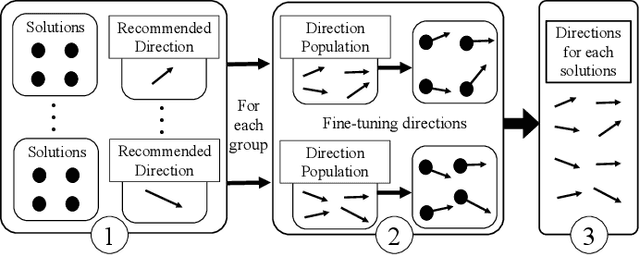
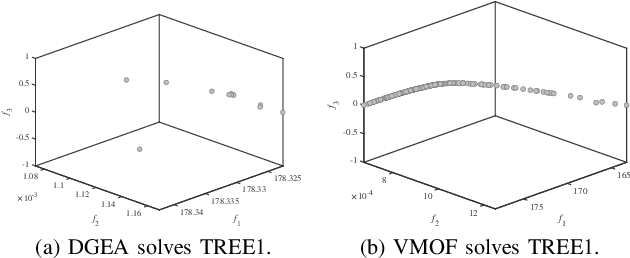
Abstract:We define very large multi-objective optimization problems to be multiobjective optimization problems in which the number of decision variables is greater than 100,000 dimensions. This is an important class of problems as many real-world problems require optimizing hundreds of thousands of variables. Existing evolutionary optimization methods fall short of such requirements when dealing with problems at this very large scale. Inspired by the success of existing recommender systems to handle very large-scale items with limited historical interactions, in this paper we propose a method termed Very large-scale Multiobjective Optimization through Recommender Systems (VMORS). The idea of the proposed method is to transform the defined such very large-scale problems into a problem that can be tackled by a recommender system. In the framework, the solutions are regarded as users, and the different evolution directions are items waiting for the recommendation. We use Thompson sampling to recommend the most suitable items (evolutionary directions) for different users (solutions), in order to locate the optimal solution to a multiobjective optimization problem in a very large search space within acceptable time. We test our proposed method on different problems from 100,000 to 500,000 dimensions, and experimental results show that our method not only shows good performance but also significant improvement over existing methods.
An Evolutionary Multitasking Algorithm with Multiple Filtering for High-Dimensional Feature Selection
Dec 17, 2022Abstract:Recently, evolutionary multitasking (EMT) has been successfully used in the field of high-dimensional classification. However, the generation of multiple tasks in the existing EMT-based feature selection (FS) methods is relatively simple, using only the Relief-F method to collect related features with similar importance into one task, which cannot provide more diversified tasks for knowledge transfer. Thus, this paper devises a new EMT algorithm for FS in high-dimensional classification, which first adopts different filtering methods to produce multiple tasks and then modifies a competitive swarm optimizer to efficiently solve these related tasks via knowledge transfer. First, a diversified multiple task generation method is designed based on multiple filtering methods, which generates several relevant low-dimensional FS tasks by eliminating irrelevant features. In this way, useful knowledge for solving simple and relevant tasks can be transferred to simplify and speed up the solution of the original high-dimensional FS task. Then, a competitive swarm optimizer is modified to simultaneously solve these relevant FS tasks by transferring useful knowledge among them. Numerous empirical results demonstrate that the proposed EMT-based FS method can obtain a better feature subset than several state-of-the-art FS methods on eighteen high-dimensional datasets.
Balancing Exploration and Exploitation for Solving Large-scale Multiobjective Optimization via Attention Mechanism
May 20, 2022

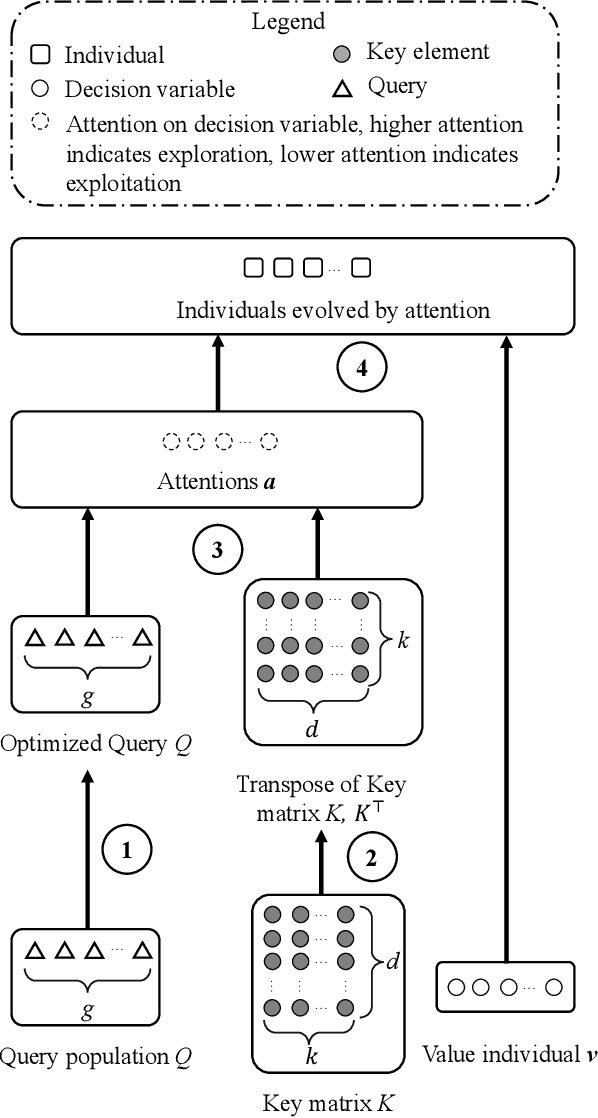

Abstract:Large-scale multiobjective optimization problems (LSMOPs) refer to optimization problems with multiple conflicting optimization objectives and hundreds or even thousands of decision variables. A key point in solving LSMOPs is how to balance exploration and exploitation so that the algorithm can search in a huge decision space efficiently. Large-scale multiobjective evolutionary algorithms consider the balance between exploration and exploitation from the individual's perspective. However, these algorithms ignore the significance of tackling this issue from the perspective of decision variables, which makes the algorithm lack the ability to search from different dimensions and limits the performance of the algorithm. In this paper, we propose a large-scale multiobjective optimization algorithm based on the attention mechanism, called (LMOAM). The attention mechanism will assign a unique weight to each decision variable, and LMOAM will use this weight to strike a balance between exploration and exploitation from the decision variable level. Nine different sets of LSMOP benchmarks are conducted to verify the algorithm proposed in this paper, and the experimental results validate the effectiveness of our design.
Benchmark Problems for CEC2021 Competition on Evolutionary Transfer Multiobjectve Optimization
Oct 15, 2021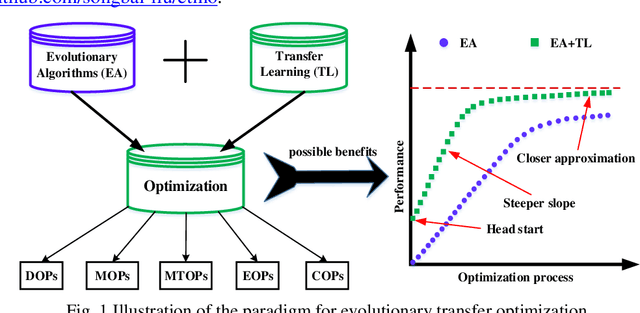
Abstract:Evolutionary transfer multiobjective optimization (ETMO) has been becoming a hot research topic in the field of evolutionary computation, which is based on the fact that knowledge learning and transfer across the related optimization exercises can improve the efficiency of others. Besides, the potential for transfer optimization is deemed invaluable from the standpoint of human-like problem-solving capabilities where knowledge gather and reuse are instinctive. To promote the research on ETMO, benchmark problems are of great importance to ETMO algorithm analysis, which helps designers or practitioners to understand the merit and demerit better of ETMO algorithms. Therefore, a total number of 40 benchmark functions are proposed in this report, covering diverse types and properties in the case of knowledge transfer, such as various formulation models, various PS geometries and PF shapes, large-scale of variables, dynamically changed environment, and so on. All the benchmark functions have been implemented in JAVA code, which can be downloaded on the following website: https://github.com/songbai-liu/etmo.
Review of Single-cell RNA-seq Data Clustering for Cell Type Identification and Characterization
Jan 03, 2020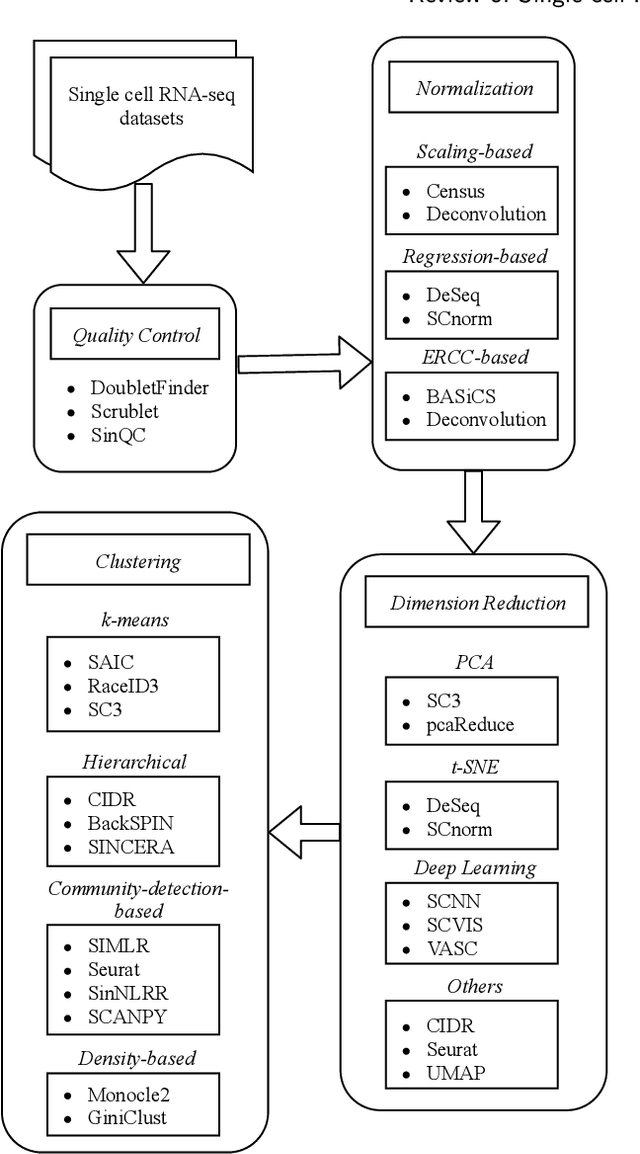
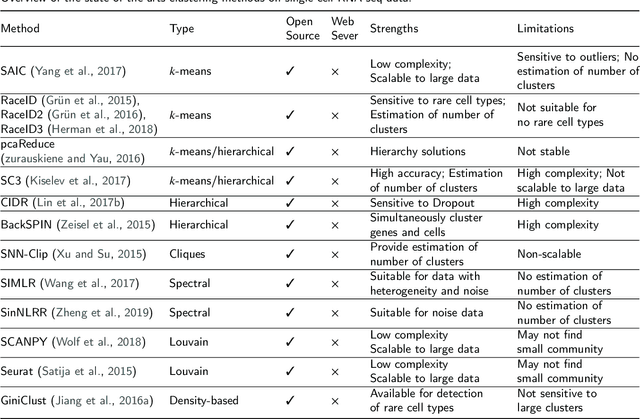
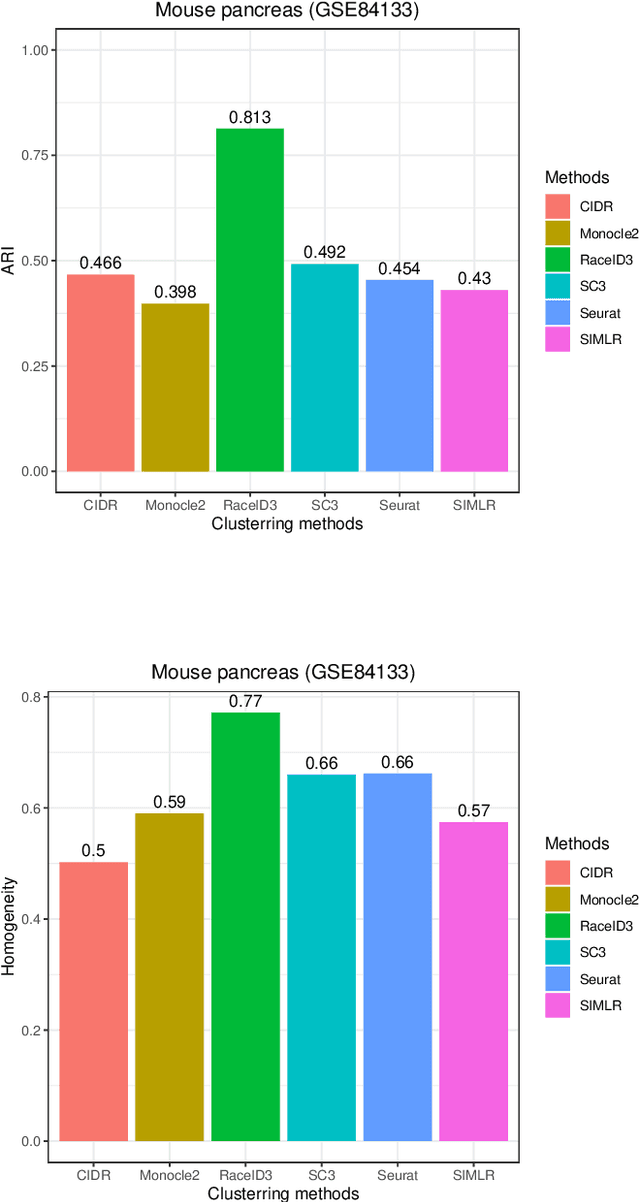
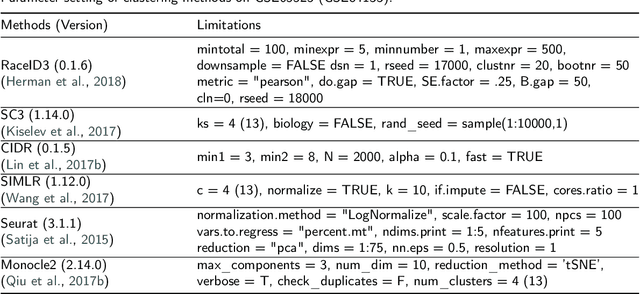
Abstract:In recent years, the advances in single-cell RNA-seq techniques have enabled us to perform large-scale transcriptomic profiling at single-cell resolution in a high-throughput manner. Unsupervised learning such as data clustering has become the central component to identify and characterize novel cell types and gene expression patterns. In this study, we review the existing single-cell RNA-seq data clustering methods with critical insights into the related advantages and limitations. In addition, we also review the upstream single-cell RNA-seq data processing techniques such as quality control, normalization, and dimension reduction. We conduct performance comparison experiments to evaluate several popular single-cell RNA-seq clustering approaches on two single-cell transcriptomic datasets.
 Add to Chrome
Add to Chrome Add to Firefox
Add to Firefox Add to Edge
Add to Edge